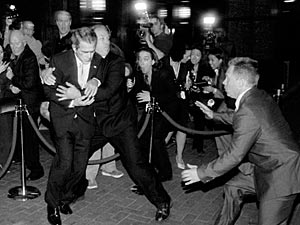
Controversy
is common marketing currency. It may not have done much for Pasolini, perhaps
killed for making Salo, or for Theo van Gogh, definitely killed for making Submission.
But less incendiary films by Scorsese, Michael Moore and Mel Gibson have all benefited
from the protests of audiences and activists and the media coverage those
actions generate.
But for
Gabriel Range’s Death of a President, which depicts the assassination of
President G. W. Bush in a faux-documentary style, the source of the backlash
isn’t potential audiences. It’s the exhibitors who are revolting. Curious about
the film? Your options are limited.
Early
this month, Regal Entertainment Group CEO Mike Campbell said, "We would not
be inclined to program this film. We feel it is inappropriate to portray the
future assassination of a sitting president." [Edit: Campbell is an outspoken and generous Bush supporter.]
Regal is the largest chain
in the nation, and losing those screens, as well as those belonging to other
exhibitors who have taken a similar stance to the film, will limit the film’s
release to just over 100 screens, many of which belong to Mark Cuban’s Landmark
Theaters chain.
Never
mind that Death of a President is not a violent film, or that it doesn’t
advocate the assassination. (Or any political action, for that matter.) The
concept is enough to make it a no-fly zone for theater chains happy to make
money off Hostel.
People
are laboring under misconceptions about the film, says Range, who I spoke to
earlier this week. "It’s kind of shocking that someone like [Hilary
Clinton] would reach a verdict on a film without having seen it. It’s ironic,
because the film touches on rushed judgment as a theme. And people think the
film is something it isn’t, like an exercise in liberal fantasy or wish
fulfillment, that it’s cheering the assassination of Bush."
The film
isn’t at all inappropriate, said Richard Abramowitz, head of marketing and
distribution for distributor Newmarket. "I don’t know who among Regal’s
executives have seen or have not, but I can tell you that anyone who has seen
would testify that it in no way advocates any violence. The assassination,
while pivotal, is handled so discretely that if you blink, you’ll miss it.
There’s no gore, no slo-mo porn, it happens in blink of eye, and propels the
film forward. This is not a snuff film, it’s a thriller."
"There’s
a school of thought in which imagining the assassination crosses the
line," says Range. "I don’t see that, I really don’t. For an elected
official I think it’s entirely legit to ask this question. It’s not inciting
anyone to commit this act. Of course I can see that it would be upsetting for
some people…the Bush family are probably not excited to see the film. But I
don’t think it crosses the line."
In
addition to the exhibitor disinterest, large media outlets have shied away from
advertising the film. "NPR and CNN have rejected ads based on the ‘extreme
nature’ of the film," says Abramowitz. "Because, I guess, it’s like Saw.
There’s no dismemberment in this movie. The film no more advocates
assassination than Silence of the Lambs does cannibalism."
"To
clarify, NPR doesn’t buy ads, but accepts sponsorship. But not ours. They
initially covered it, but claim that they’re covering it as news and don’t want
to take a sponsorship because they don’t want anyone to misinterpret that as
quid pro quo. But that suggests they can never take any sponsorship from
anything related to a news story. I haven’t done market research, but I’d bet
there’s a film they’ve reviewed that they’ve accepted sponsorship from in the
past."
(During
our conversation Abramowitz called Fox TV and Fox Online’s decision to air the
movie’s ads ‘the only fair and balanced thing’ the network has done all year,
before calling me back to say that Fox had dropped the ads later that morning.)
But in
the end, does it really matter that large chains are refusing to show a film
they likely would have left to Landmark anyway? Many small distributors
consider theatrical distribution little more than an ad for DVD sales.
With
respect to the balancing act between dispelling misconceptions and relying upon
them, "It goes both ways," Abramowitz says. "Without the
controversy, the film wouldn’t be as visible. But with it, we have to fight the
impressions that have been given about the film. In the ads, we’ve tried to
point out that the positions taken are by people who haven’t seen the film.
We’re trying to both combat and exploit the scenario."
Range
defends his subject matter, and the imagery used to explore it. "The
central image [used on the poster] has fueled controversy. But like the
premise, it’s provocative. I think film should be provocative, and should be
outrageous."
Abramowitz
left me with a similar thought. "When you’re assailed by both Hilary
Clinton and Rush Limbaugh, you’re either doing something very wrong or very
right, and I’d suggest it was the latter."